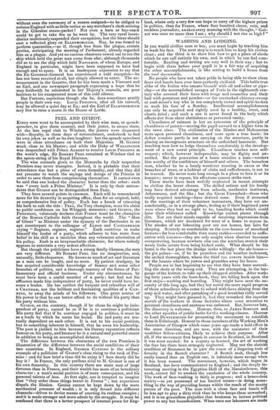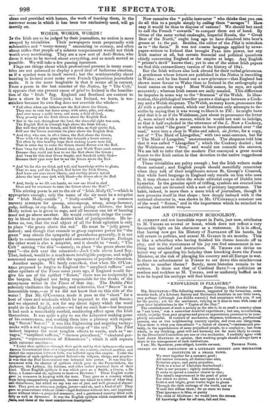WASHING AND LODGING.
Ir you would civilize man or boy, you must begin by teaching him to wash his face. The next step is to teach him to keep his clothes clean ; and the third is to show him how to get a place of abode which be can call entirely his own, and in which he can feel com- fortable. Reading and writing are very well in their way ; but to begin with them before your pupil is in a fair way of acquiring the other accomplishments, is like setting to build a house from the roof downwards.
No people who have not taken pride in being able to show clean
faces and hands have ever been perfectly civilized. This holds true alike of the Indian who smears himself with oil and ochre or pipe- clay—or the accomplished savages of Paris in the eighteenth cen- tury who covered their faces with rouge and cosmetics and their hair with pomatum and powder—or the overtasked chimney-sweep or coal-miner's boy who is too completely cowed and spirit-broken to wash his face of a Sunday. Intellectual accomplishments can only be acquired and rightly used by a healthy, erect, and elastic mind ; and such a one is never found in the body which affects dirt from sheer sluttishness or perverted vanity.
Cleanliness of raiment is but an extension of the principle of cleanliness of person—moving the pupil onward to a higher form in the same class. The civilization of the Hindoo and Mahometan rests upon personal cleanliness, and rests upon a true basis : its defect consists partly in not carrying on the structure, partly in placing an incongruous structure on the unfinished basement. But teaching men how to lodge themselves comfortably is the develop- ment of a new moral principle. Cleanliness teaches men self- respect ; which, however indispensible, may be flighty and un- settled. But the possession of a home steadies a man—renders him worthy of the confidence of himself and others. The homeless man, whether he be a lonely wanderer roosting in caves or the branches of trees, or a habitué of clubs and coffeehouses, is not to be trusted. He never rests long enough in a place to love it or its inmates; never in repose, his affections cannot strike root.
These truths have been wofully neglected in recent attempts
to civilize the lower classes. The skilled artisan and his family may have derived advantage from schools, mechanics institutes, Athenxums, and the like ; but the Great Unwashed—those who really required teaching—have derived none. Even if attracted to the meetings of their volunteer instructers, they have sat un- comfortably, as in a strange place, feeling as if their begrimed paws were where they had no right to be, handling books which could have their whiteness soiled. Knowledge cannot pierce through dirt. Nor are their minds capable of receiving impressions from literature, which are deadened for want of a home to repose in. The abodes of our labouring poor are not homes, but lairs for sleeping. Scarcely so comfortable as the cow-houses of moorland farmers—far less comfortable than many stables—crowded to suffo- cation with inmates—they are only sought when slumber becomes overpowering, because nowhere else can the wretches stretch their weary limbs secure from being kicked aside. What should be his home is the last place the drudge seeks willingly : the ale-house- the gin palace—or, if he be penniless and the weather inclement, the arched thoroughfare, where the thief too cowers beside him— are the haunts where he yawns and grumbles away his hours.
People are at last beginning to see that they have been unravel-
ling the skein at the wrong end. They are attempting, in the lan- guage of the knitter, to take up their dropped stitches. After work- ing forty years with the horn-book, they are falling back upon the first steps—washing and boarding. They might have seen the ne- cessity of this long ago, had they but noted the more rapid progress of those schoolboys who come to school with faces shining from the soap and water, and after partaking of a good breakfast tidily served up. They might have guessed it, had they remarked the superior morale of the workers in those factories where some attention to personal cleanliness and neatness was enforced. But, however late, the discovery is welcome. Honour, then, to JAMES &mews and the other apostles of public baths for the working-classes. Honour to Lord DUNFERMLINE for promoting the movement to establish them in Edinburgh. Honour to those members of the Working Men's Association of Glasgow which some years ago made a bold effort in the same direction, and are now, with the assistance of their wealthier fellow-citizens, likely to achieve their purpose. After all, if the movement first began in earnest in Scotland, in Scotland. it was most needed : for a country so learned, the art of washing the face has there been strangely neglected. May not the sluttish erudition of Scotsmen be in part the cause of a lingering trait of ferocity in the Scotch character ? A Scotch mob, though less easily roused than an English one, is infinitely more savage when it has been roused. The movement, however, which began in Scotland, has been communicated to England ; and the deeply in- teresting meeting in the Egyptian Hall of the Mansionhouse, this week, cannot fail to awaken the emulation of the whole country. The work of face-washing is fairly in progress ; and a benevolent society—as yet possessed of too limited means—is doing some- thing in the way of providing homes within the reach of the scanty purses of the poor. The man with a clean face and hands will be less apt to play a dirty trick than he who keeps them unwashed; and it is no groundless prejudice that hesitates to intrust political power to any but householders. When once our labourers are made clean and provided with homes, the work of teaching them, in the narrower sense in which it has been too exclusively used, will go merrily on.



























 Previous page
Previous page